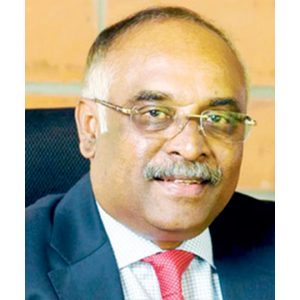By Dr. R. Balasubramaniam
There is so much talk today about the GDP and the economy not doing well across the political and business spectrum in the country. Discussions about the falling sales of cars, the sluggish real estate sector and NPAs of banks dominate the headlines. If you look at the narrative around the world and not just India, the current economic order is failing and ‘for-profit’ behaviour has taken away everything that can be sustainable. There is an urgent need to metamorphose into a new economic order where we move from a ‘for-profit’ mindset to that of a ‘for-benefit’ one. We need to create a new economic order that draws the public DNA from the Government sector, the efficiencies of the corporate sector and the social conviction and commitment of the civil society sector. It will have to look at revenue generation not as evil but as necessary to ensure benefit to all stakeholders.
Few of us have stopped to think whether the current economic model itself could be flawed and whether this could be a good opportunity for all of us to explore more sustainable alternatives. The discussions usually stop at tweets about the Finance Minister’s inability to stop the slowing down of the economy or articles by former Economic Advisors to the Government on how best to kick-start growth. There is no discourse on whether India can take the leadership on shifting the paradigm from driving growth by endless consumption to moving towards creating benefits for all involved in the economic food chain.
For a country to take on such a mandate needs a leader with vision, the political will to go against the tide, the determined optimism to endure the ups and downs and the inspirational presence to urge the citizens to walk the talk along with him/her. This requires that the leader understand that such a shift will not happen with passing legislations or extending tax concessions and subsidies. It can happen only when one understands that the problem on hand is complex and demands huge adaptive change. It needs individuals and institutions to change their centuries old values, beliefs and practices. Can India produce such a leader and move the needle in this direction?
Political leadership should accept responsibility to be ‘different’ and not be dictated by mere electoral or political considerations or distracted by the noise created by their detractors. They need to own up the responsibility of creating a facilitatory eco-system and the appropriate legal, policy and taxation architecture. They need to be able to inspire fellow citizens to be a part of the change and a part of the solution framework. Calling for the stoppage of using single use plastic and safeguarding our water resources is only the beginning. What one needs is a deeper recalibration of our own consumption patterns and lifestyle priorities. Convincing voters on enduring short- term pains keeping the long-term benefits in mind goes beyond oratorial capacity and needs someone with the credibility and the ability to provide Statesmanlike leadership.
Our current Prime Minister could turn out to be the right person at the right time, if he is able to do what is needed for the moment. Going beyond his existing band of Advisors, seeking out expertise from all sections of society, allowing himself to be vulnerable and showing restraint with differing views will indeed make a good beginning.
The task is indeed overwhelmingly large and one cannot sit back and wait for the powers alone to act. Each one has to understand that we need to bring out the ‘leader’ in us if we truly desire this change. Industry captains need to ask themselves difficult questions and have the courage to move beyond shareholder pressures and their own personal intent of generating profits at any cost. They need to consciously take on the mandate of focusing on the triple bottom line of planet, people and profits and move their organisations towards being socially and environmentally responsible in the true sense of the term.
Social organisations and NGOs have a declared purpose of responding to societal demands and for mobilising communities to participate in the development that affects their lives. They need to keep the flame burning and egg all the stakeholders to stay focussed on shifting the narrative from a ‘growth economy’ to ‘sustainable development’. NGO leaders need to prepare themselves and their organisations with the intellectual and emotional bandwidth to be the initiators of a change that is still in its infancy and is yet ambiguous. They need to grapple with the uncertainties that go with such a situation and not lose hope or the faith that they can accomplish this change. They now have to acquire the capability of going beyond seeking donations, to generating resources on their own to ensure that they continue to engage in this model of social development without being too dependent on public or private funds.
Finally, what can really allow this new economy to emerge will be the leadership that each of us as individuals can show. Instead of making excuses about how small our contributions will be or how large and unsolvable the problem on hand is, we need to come to terms with our own misplaced priorities. We need to move away from a lifestyle that is consumption-driven, based on ecological destruction and loaded with a huge carbon footprint. Making changes is not easy, whether it is eating vegetarian foods or using public transport more often. From seeing clothes as a fashion statement to being a bare necessity is easier said than done. We need to demonstrate leadership in the several roles that we play in everyday life — whether as a consumer, as a voter, as an employee or as a shareholder in a corporate entity. Our choices will have market impacts and making such a conscious shift demands enlightened leadership of a high order.
The timing is appropriate for us to explore the emergence of a new economic order that seeks to create public good while ensuring reasonable private gains for the entrepreneur. We need to build the system to transform into an economy that promotes ‘benefits’ for all stakeholders involved. Unless capitalism gets embedded in compassion, equity, fairness and justice for all stakeholders engaged in generating it, sustainability will remain just a fashion statement. For a world that seems to be rapidly absorbing and celebrating the spirit of market economics and individual attainment, this will seem unreal and difficult to undertake. But embedded in this paradigm of a soulful economy is the consideration of the state of the planet, the people involved and the gains that everyone needs to get on an equitable basis. And it is in this movement away from mindless ‘profit maximisation’ for the shareholders to ‘benefit optimisation’ for stakeholders does a sustainable world economic order lie. And this requires each one of us to awaken the ‘leader’ within us and play our part instead of complaining, criticising or proselytising.
[Dr. R. Balasubramaniam, the Founder of Swami Vivekananda Youth Movement (SVYM) & GRAAM, teaches leadership at Cornell University and IIT-Delhi. He can be reached at [email protected]]








These ideas have been around since Thoreau’s “Walden” was published around 1847 and subsequently resurrected by Tolstoy, Gandhi and others. They got a huge impetus in the 1960s with the back to nature and environmental movements, EF Schumacher’s “Small is beautiful” and many other writers, thinkers and economists who tried to put people and the environment, rather than numbers and GDP at the heart of development. A paradigm shift has become an existential necessity with climate change, mass extinction of species and clogging of our land and oceans with plastics and other debris of our way of life. We need a new way. But to suggest, as the author does, that our current PM is going to be the man to do this is not only laughable, but dangerous. The author may have a vested interest in promoting this idea that this slowdown is deliberate, an act of “creative destruction” and the result of our PM’s great vision. Or, more possibly it is the result of a blind hero worship (Swami Vivekananda, with his scientific temper would have been the first to be appalled at the way he himself is now worshipped by some) of our PM. The slowdown is the result of mismanagement and of destruction (sans creation). The stated aim was “ease of doing business”, and ease of winning election, not loftier ideals of environmental protection or sustainability. Our PM struts around in expensive clothes, wearing brand watches, spending crores on foreign trips, leaving a huge carbon footprint, so that he can have a PR moment hugging some obnoxious foreign leader. What a contrast with a Sunderlal Bahuguna who hugged trees, or a Gandhi who wore dhoties he had spun himself and travelled third class in trains or by walking. We need a new way, but to suggest that our present PM is going to show us this way, beggars belief!
@Govinda Pai You have really angered this article’s author and the plethora of Modi worshippers!!
These worshippers do appreciate their leader jetting around world, wearing expensive clothes and watches and taking selfies with foreign leaders. For them, he can do nothing wrong. Indeed PMs like Rajiv Gandhi wore Gucci shoes, Armani dress and pontificated about the poor in India!
There is not going to be a new way, unfortunately , from this PM. He knows, his followers will worship him whatever he does, even if it is unpalatable to many sensible people. This is India after 70+ years of independence.